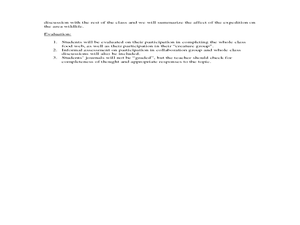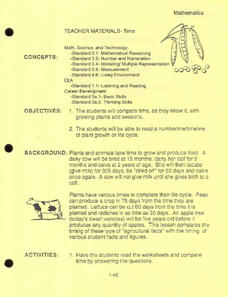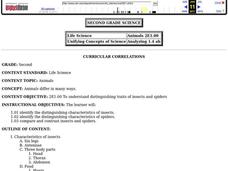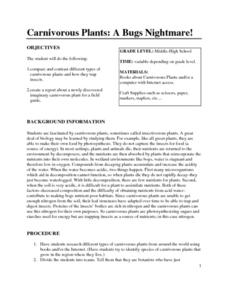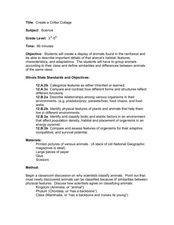Curated OER
Animals and Environments
Students listen to stories and identify animals and their young. In this animals instructional activity, students view videos about farm animals and create illustrations to show how animal babies change over time. Students...
Curated OER
Animals and the Food Webs that Love Them
Students study the animals that Lewis and Clark would have encountered. In this animals lesson students study the food web and how human populations have affected them.
Aquarium of the Pacific
Ecosystem Comparison
Fifth graders examine plants and animals in two ecosystems and compare them. In this ecosystem survival activity, 5th graders compare and contrast a coral reef and kelp forest ecosystem. Students investigate the abiotic and biotic...
Curated OER
Time
An interesting lesson focuses the growth cycles of plants and animals. Learners look at plants like radishes, peas, and apples, and compare their growth cycles to those of dairy cows. Some very good worksheets are included in this plan...
Rainforest Alliance
Protecting the Critical Habitat of the Manatee and Loggerhead Turtle
Explore ocean habitats with a lesson that showcases the home of manatees and loggerhead turtles in Belize. Here, pupils compare and contrast the homes of ocean animals to those of humans, listen to an original short story about...
Curated OER
Woodland Animals and Their Habitat
Students explore the natural environment through a video and nature sounds tape. They keep journal's of the unit's activities and vocabulary terms. They play a web of interdependence game and compose a list of forest animals and write...
Curated OER
Costa Rican Food Chain
Discuss the animals and plants in the rainforest food chain using this lesson. Learners talk about and do research on the top predators from the Costa Rican region and create a model of one of them in class. They also make a visual model...
Curated OER
Animals
Second graders explore the ways in which animals differ. They discuss the characteristics of insects and spiders. Students identify the characteristics of insects and spiders. They compare and contrast insects and spiders.
Curated OER
Plant Lifecycles
Students examine the life cycle of plants. For this plants lesson, students identify the various stages of plants and their parts. Students compare the life cycle of a plant with that of an animal. Activities suggested can be modified...
Curated OER
Exploring Biomes Lesson 3: Endangered Biomes
Future environmental scientists compare data from two different conservation strategies. Alone this lesson is sufficient, but as part of the Exploring Biomes unit produced by the Arizona Fish and Game Department, it becomes top-notch.
Curated OER
Recycling
Students explore the recycling process. In this recycling activity, students gain understanding of how garbage is disposed of. Students makes lists of things that can be recycled. Students discuss how animals and plants are damaged by...
Curated OER
Fall vs. Spring
Students compare and contrast the seasons of fall and spring. In this fall and spring lesson plan, students learn the differences between fall and spring through books and pictures, identify the differences, draw their own pictures, and...
Science Matters
Celery Lab
See firsthand the work plants do to move nutrients through their systems with a lesson that demonstrates the role of the xylem and phloem in plants. Young scientists observe celery move colored water through its stem to the leaves and...
Curated OER
Carnivorous Plants: A Bugs Nightmare!
Students research carnivorous plants and how they trap insects. They role play as botanists to write a research field guide about a newly discovered imaginary carnivorous plant.
Curated OER
Patterns and Adaptations in Plants and Animals
Fourth graders conduct research about some of the regions of Texas. They compare plants and animals to identify different adaptations. The statistics of survival rates are measured for changes.
Curated OER
Animals
First graders study the basic needs of animals and compare them to human needs. They make bird feeders using milk carton and pine cones. They review the basic needs of food, water, air, and shelter and discuss what happens when animals...
Curated OER
Critters in Your Own Backyard
Students identify various animals and their habitats, as well as their specific traits In this animal habitat lesson, students list animals they've seen in their backyard. Students select one animal and do research. Students then answer...
Curated OER
COMPARE SOILS BY GROWING PLANTS
The student will identify the difference in the rate of plant growth in three soils that vary in organic matter.1. Obtain three to four flowerpots, different types of soil, a record chart, three to five beans for each pot, and water....
Curated OER
What Do You Know About the Birds Around You?
Students compare and contrast various species of birds. After participating in a brief discussion of the characteristics of birds, they view birds in their natural habitat and in pictures with a focus on the similarities and differences...
Curated OER
Temperate Forests vs. Wetlands
Students compare and contrast the temperate forest and wetlands by researching them in groups. In this forest lesson plan, students identify the economic, ecological, and social benefits of each.
Curated OER
Create a Critter Collage
Students create a collage. In this animal classification instructional activity, students discuss why and how scientists classify animals. Students view pictures of different animals and decide which class each animal belongs to....
Curated OER
Habitats of the World
Students discover that the Earth supports many different animal habitats. In this habitat lesson students research different habitats of the world. Students show how the animals in their habitat are adapted.
Curated OER
What Makes a Cat a Cat?
Students investigate the lives of pets by videotaping them. In this animal life lesson, students videotape a cat and other pets using school cameras in a computer lab. Students review the footage from the cat and other...
Curated OER
Fall vs. Spring
Students compare fall and spring. In this seasonal changes lesson, students read the book Apples and Pumpkins and discuss the fall season. The students then read It's Spring and describe the spring season. As a culminating activity,...

